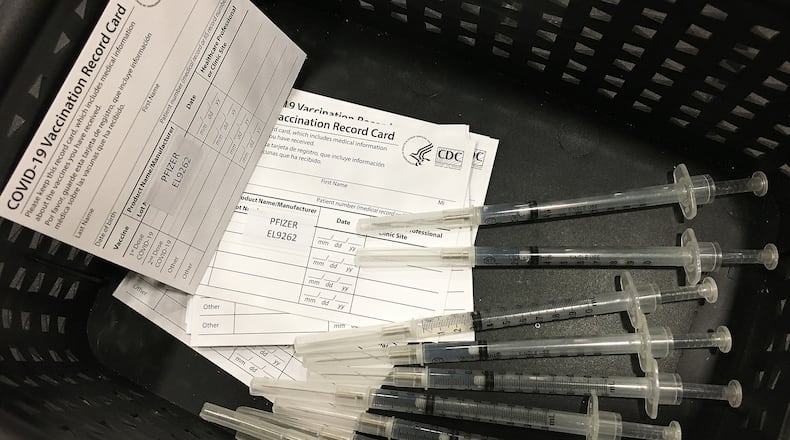Local experts quoted in this article are:
- Dr. Mamle Anim, chief medical officer for Five Rivers Health Centers.
- Dr. Robert W. Frenck Jr., professor of pediatrics at Cincinnati Children’s Hospital Medical Center, director of the Gamble Center for Vaccine Research and the immunization program medical director of the Ohio American Academy of Pediatrics.
Other experts on our panel for this project are:
- Gregory Braylock, RPh, pharmacy manager at Zik’s Family Pharmacy in Dayton.
- Dr. Roberto Colón, chief medical officer at Premier Health’s Miami Valley Hospital.
- Dr. Michael Klatte, chief of infectious disease at Dayton Children’s Hospital.
- Dr. Alonzo Patterson III, pediatrician with PriMed Physicians.
- Dr. Nancy Pook, Kettering Health Emergency Medical Director.
Q: I am fully vaccinated against COVID-19. How long does the vaccine protect me?
Frenck: It depends on your definition of “protects.” My goal is to keep people out of the hospital. The vaccines approved by EUA all are still over 90% for keeping you out of the hospital if you get infected. That still is a tremendous protective effect.
Anim: For now we don’t have information on exactly how long the vaccine offers protection. What has become increasingly clear is that the protection wanes over time which is why a booster is now being recommended to bolster the antibody levels. I suspect that there is a variation of how long it lasts from person to person. The CDC has settled on 8 months on average and like most things this won’t be exact for every individual. There may be more data which will change this recommendation. I am glad that experts continue to respond to new data and adjust recommendations accordingly, unfortunately COVID-19 virus is not static virus, its keeps changing and so should our response.
Q: I had COVID-19. Do I need to get the coronavirus vaccine and why?
Frenck: Natural infection does not give you as good of immunity as compared to vaccine. One study published in MMWR evaluated people who had COVID and then did, or did not, subsequently get vaccinated. It was found that, as compared to the vaccinated,, the unvaccinated were 2.5 times more likely to get COVID again
Anim: It has been shown that the natural antibodies in people who get the COVID-19 infection build drops over time, in most the antibodies have either disappeared or no longer protective after 90 days. It is recommended that one can get the vaccine 30 days after infection has cleared unless they received a monoclonal antibodies infusion to treat the infection in which case they scan be vaccinated after 90 days
Q: How many people are being injured or dying from the coronavirus vaccine?
Frenck: I know of no one who has died from the vaccine. The rates of serious side effects, such as myocardial and blood clots are incredibly rare, in the range of 1-2 per 100,000 or less.
Here’s some more information: The U.S. Food and Drug Administration requires health care providers to report anybody who died after getting a COVID-19 vaccinations (even months after their shot) to the Vaccine Adverse Event Reporting System (VAERS). These deaths are not necessarily linked to the vaccine. According to the Centers for Disease Control and Prevention, reviews of available clinical information has thus far not established a causal link between any deaths and COVID-19 vaccines.
More than 175 million Americans received a coronavirus vaccine between Dec. 14 and Aug. 30. During that time, VAERS received 7,218 reports of death (.002%) among people who received a shot.
Some reports suggest a plausible causal relationship between the J&J/Janssen COVID-19 vaccine and TTS, a rare blood clotting syndrome that can be fatal. A CDC report from May identified 28 confirmed TTS cases after the J&J vaccine (.000003% of the 8.73 million doses given out at the time). Of those, 3 people died.
Have questions about COVID-19, face masks, vaccines, testing, quarantining or anything else pandemic-related? Send them to jordan.laird@coxinc.com or submit them below. Answers will be published regularly in print and online.
About the Author

